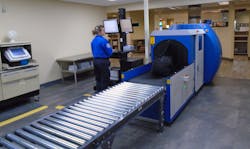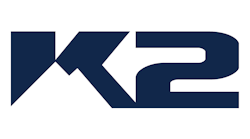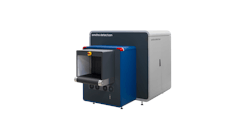TSA Checkpoint at BFF Gets New 3-D Scanners To Improve Explosives Detection
The Transportation Security Administration (TSA) installed new baggage screening equipment at Western Nebraska-Scottsbluff Regional Airport (BFF). The new equipment is expected to drastically reduce the number of checked bags security officers need to open and conduct additional inspection.
Previously 100% of all checked baggage were required to be opened for explosive detection screening, that number is now expected to hover around 5%, according to Transportation Security Administration (TSA) officials.
“This will result in faster bag screening, reduced passenger complaints and most importantly increased security posture,” said TSA Nebraska Assistant Federal Security Director Kevin Wigton.
TSA technicians recently completed the installation of a new CTX 5800 Explosive Detection System (EDS) at the Scottsbluff airport. The equipment is expected to be faster than the previous screening process, increase TSA’s ability to identify threats, reduce the number of false alarms and lower operational costs. The EDS quickly and accurately identifies threats using a single X-ray generator to provide high-resolution 3D images, according to the manufacturer Smith’s Detection. The CTX 5800 is one of several EDS systems offered by Smith’s Detection and is specifically designed for use in airports with space or weight restricted environments.
It is compact but flexible, and with simple extension can process anything from large duffle bags to skis and golf bags. The system also has at least one eye on the future, offering adjustable inspection options based on security and operational needs, or the demands of future screening protocols.
TSA is also reminding passengers of other steps they can take to get through the checkpoint quickly and efficiently.
Tip 1: Face masks are optional, but recommended. The CDC recommends face masks for passengers aged two and older in indoor areas of public transportation and transportation hubs as an effective precaution for those who seek to avoid exposure to COVID in higher risk public spaces. CDC provides health recommendations for domestic travel during COVID-19 and for international travel on its website at CDC.gov.
Tip 2: Pack smart; start with empty bags. Airline passengers who pack for travel with empty bags are less likely to bring prohibited items through a TSA checkpoint. Technology and modifications help reduce the need for physical contact with TSA officers, but those who take time to come prepared for the TSA checkpoint are far more likely to avoid delay and physical contact. Check for prohibited items by using the “What Can I Bring?” page on TSA.gov.
Tip 3: Know before you go. Airports, like highways, have high traffic surges and construction delays. Plan to arrive at the airport in plenty of time to check in, check bags and complete security screening in time to avoid stressful sprints to the departure gate. At the TSA checkpoint, have a valid ID card readily available and follow the liquids rule of 3.4 ounces or less, with the exception of hand sanitizer, which has a temporary 12-ounce limit in carry-on baggage.
Tip 4: Contact TSA for help if there are questions or concerns. Those who are preparing to travel and may have special circumstances, considerations or general questions about airport screening can get live assistance by tweeting questions and comments to @AskTSA or via Facebook Messenger, daily from 8 a.m. to 6 p.m. EDT. You can also call the TSA Contact Center at 866-289-9673.
TSA also offers TSA Cares, a helpline for travelers with disabilities, medical conditions and other special circumstances. You may submit a request for assistance by calling TSA Cares at 855-787-2227, weekdays from 8 a.m. to 11 p.m. and weekends/holidays from 9 a.m. to 8 p.m. Passengers may also use the TSA Cares form available on the TSA website which can be found at https://www.tsa.gov/travel/passenger-support.
Tip 5: Enroll now in TSA PreCheck to “Travel with Ease.” By enrolling in TSA PreCheck, airline passengers can avoid removing shoes, belts, liquids, food, laptops and light jackets at the TSA checkpoint. Most new enrollees receive their known traveler number within five days, and membership lasts for five years. In April, 94% of TSA PreCheck passengers waited less than 5 minutes at the checkpoint.


